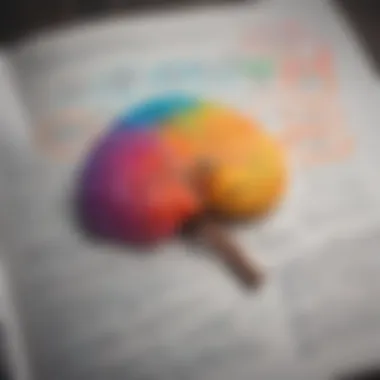Exploring Unique Journal Writing Ideas for Personal Growth and Reflection


Research Overview
Journaling has been shown to be a powerful tool for personal growth and self-reflection. This section will provide an introduction to the significance of journal writing in facilitating introspection and self-improvement. Existing research findings on the positive impact of journaling on mental well-being and emotional intelligence will be summarized. The key research methodology focusing on the effectiveness of journal prompts and techniques will be explained in detail.
Health Implications
The impact of journal writing on health and well-being will be discussed in this section. By exploring the potential benefits and risks associated with regularly engaging in journaling practices, readers will gain insight into how journaling can promote mental wellness and enhance personal growth. Practical examples of how individuals can integrate journaling into their daily routine to support their overall health will be highlighted.
Well-being Strategies
Derived from research, practical tips and strategies for enhancing well-being through journal writing will be presented. Readers will receive expert advice on implementing positive changes in their lives through reflective journaling practices. Personal stories or case studies will be shared to illustrate the transformative power of journaling in promoting mental health and self-discovery.
Expert Insights
In this section, expert opinions on the benefits of journaling for personal growth and reflection will be analyzed. A Q&A session with a relevant expert in the field of psychology or self-development will provide further insights into the role of journaling in fostering emotional resilience and self-awareness.
Introduction
The genesis of this article lies in the profound impact journal writing can have on personal growth and self-reflection. Journaling transcends mere scribbles on paper; it is a tool that can unlock the deepest recesses of the mind, providing clarity and insight like no other. In a fast-paced world full of distractions and noise, taking the time to put pen to paper allows individuals to pause, reflect, and delve into their innermost thoughts and emotions. The art of journaling acts as a mirror, reflecting back our hopes, fears, and aspirations with profound honesty. It serves as a compass, guiding us through the twists and turns of life's journey.
An essential aspect to consider in this exploration is the transformative power of journaling on one's self-awareness. By consistently jotting down our thoughts, feelings, and experiences, we start to recognize patterns in our behavior, emotions, and relationships. This heightened self-awareness becomes a cornerstone for personal growth, as it enables individuals to identify areas for improvement, self-discovery, and personal transformation. Furthermore, journaling offers a safe space for emotional processing and regulation, allowing individuals to express and navigate complex feelings in a healthy and constructive manner.
Another crucial element to highlight in this discourse is the role of journaling in stress reduction and mental clarity. Amidst the chaos of everyday life, maintaining a journal provides a much-needed sanctuary for relaxation and reflection. Putting pen to paper can be a cathartic experience, alleviating pent-up stress, fears, and anxieties. The act of journaling declutters the mind, helping individuals gain mental clarity and focus amidst the noise of modern living. This space for reflection fosters a sense of calm and inner peace, essential for navigating life's challenges with resilience and clarity.
Benefits of Journal Writing
Journal writing serves as a powerful tool for personal growth and self-reflection. It enables individuals to delve deep into their thoughts and emotions, enhancing their self-awareness, emotional regulation, and mental clarity. By putting pen to paper, individuals can gain insights into their behaviors, beliefs, and values, leading to personal development and growth. Engaging in regular journaling practices can also boost creativity, reduce stress, and improve cognitive function.
Enhanced Self-Awareness


Enhanced self-awareness is a fundamental benefit of journal writing. Through the process of writing about one's experiences, thoughts, and feelings, individuals can gain a clearer understanding of themselves. Journaling allows individuals to reflect on their actions, motivations, and reactions, leading to increased self-insight. By fostering self-awareness, journal writing empowers individuals to make conscious choices aligned with their values and goals.
Emotional Processing and Regulation
Journal writing provides a structured outlet for emotional processing and regulation. By expressing emotions and experiences on paper, individuals can effectively cope with stress, anxiety, and other negative emotions. Writing about challenging experiences helps individuals make sense of their feelings and develop healthier coping mechanisms. Through journaling, individuals can identify patterns in their emotional responses, leading to improved emotional regulation and resilience.
Stress Reduction and Mental Clarity
Journal writing acts as a powerful stress reduction tool, promoting mental clarity and emotional well-being. The act of writing helps individuals organize their thoughts, release pent-up emotions, and gain perspective on stressful situations. By externalizing their thoughts, individuals can reduce cognitive load, alleviate mental clutter, and enhance problem-solving abilities. Regular journaling has been shown to lower cortisol levels, decrease anxiety, and improve overall mood and focus.
Prompts for Journaling
Daily Gratitude Journal
The daily gratitude journal, a cornerstone of positive psychology, fosters a mindset of appreciation and thankfulness. By habitually recording things we are grateful for each day, we train our minds to focus on the positives in our lives, no matter how small. This practice cultivates a sense of abundance, shifts our attention from lack to fulfillment, and nurtures resilience during challenging times. Keeping a daily gratitude journal has been associated with improved mood, enhanced relationships, and heightened overall well-being. It serves as a powerful reminder of the blessings scattered throughout our daily existence, bringing joy and contentment amidst the hustle and bustle of modern life.
Future Self Reflection
Future self-reflection is a profound exercise in envisioning our ideal selves and charting a course to manifest those aspirations. Through thoughtful contemplation on who we aspire to become, we shed light on our core values, long-term goals, and deepest desires. By visualizing our future selves with clarity and authenticity, we set a roadmap for personal growth and development. Future self-reflection prompts us to take intentional actions aligned with our aspirations, fostering a sense of purpose and direction in our journey. This practice enables us to bridge the gap between our current reality and our envisioned future, motivating us to strive towards self-improvement and fulfillment.
Mindfulness and Present Moment Awareness
Mindfulness and present moment awareness are foundational practices in journaling, promoting mental clarity, emotional equilibrium, and heightened self-awareness. By grounding ourselves in the present moment through mindful observation of our thoughts, emotions, and sensations, we cultivate a deep sense of presence and acceptance. Mindfulness prompts invite us to engage fully in our experiences, detaching from distractions and judgments. This practice not only reduces stress and anxiety but also enhances our ability to make conscious choices and respond skillfully to life's challenges. Embracing mindfulness in our journaling journey allows us to cultivate a deeper connection with ourselves, our surroundings, and the unfolding narratives of our lives.
Techniques for Effective Journaling
Techniques for Effective Journaling play a pivotal role in optimizing the journal writing process by enabling individuals to harness the full potential of their reflective practice. This section explores various methods and strategies that can enhance the quality and depth of journal entries. Effective journaling techniques serve as a scaffold, providing structure and direction to the introspective journey. By incorporating these techniques, individuals can cultivate a more profound understanding of themselves and their experiences. They act as gateways to unlocking creativity, promoting self-discovery, and organizing thoughts in a coherent manner.
Stream of Consciousness Writing
Stream of Consciousness Writing is a technique that empowers individuals to capture their thoughts in a continuous flow, without censure or judgment. This method involves allowing thoughts to naturally stream onto paper, without concern for structure or grammar. By embracing this form of writing, individuals can tap into their subconscious mind, unveiling hidden thoughts and emotions. Stream of Consciousness Writing promotes mental clarity, emotional expression, and creativity. It serves as a tool for unearthing deep-seated beliefs and unveiling patterns of thinking.


Bullet Journaling for Organization
Bullet Journaling for Organization is a systematic method that combines journaling with task management and organization. This technique utilizes bulleted entries to jot down tasks, events, thoughts, and ideas in a concise and organized manner. Bullet Journaling aids individuals in tracking their progress, setting goals, and maintaining a record of significant events. It serves as a versatile tool for time management, productivity enhancement, and overall organization. By adopting Bullet Journaling, individuals can streamline their thoughts, prioritize tasks, and foster a sense of accomplishment.
Visual Journaling and Collage Making
Visual Journaling and Collage Making involve integrating images, colors, and other visual elements into journal entries to enhance self-expression and introspection. This technique goes beyond traditional writing, allowing individuals to visually represent their emotions, ideas, and experiences. Visual Journaling fosters creativity, self-reflection, and non-verbal communication. By engaging in Collage Making, individuals can tap into their artistic inclinations, explore symbolism, and express complex emotions through visual mediums. This technique offers a multidimensional approach to journaling, enriching the reflective process through visual storytelling.
Journaling for Goal Setting and Tracking
Within the realm of journal writing, the focus on goal setting and tracking stands as a pivotal pillar for personal development aficionados striving towards continuous improvement. Delving into the intricacies of journaling for goal setting and tracking opens a window of opportunity for individuals seeking structured pathways to manifest their aspirations and monitor progress. By dedicating deliberate attention to setting specific, measurable, achievable, relevant, and time-bound (SMART) goals within the safe confines of a journal, individuals can harness the power of intentionality and focus toward their desired outcomes.
Journaling for goal setting mirrors a strategic compass, guiding individuals through their personal odyssey of growth and self-discovery. Encapsulated within each journal entry lies the roadmap to unleash one's full potential and unlock untapped reservoirs of creativity and ambition. The process of tracking these goals instills a sense of accountability and mindfulness, nurturing a conducive environment for sustained motivation and dedication.
One of the key benefits of incorporating goal setting and tracking within journal writing pertains to the cultivation of self-discipline and perseverance. As individuals meticulously log their progress, setbacks, and triumphs, they embark on a journey of self-awareness and refinement, honing invaluable skills of resilience and adaptability. Through the cyclical process of setting, revisiting, and reassessing goals, individuals immerse themselves in a continuous loop of self-improvement and evolution.
Moreover, journaling for goal setting and tracking serves as a potent tool for enhancing decision-making and prioritization skills. By aligning daily actions with overarching objectives penned down in the journal, individuals sharpen their organizational acumen and cultivate a proactive mindset. The reflective nature of journal writing facilitates a nuanced understanding of personal preferences, strengths, and areas necessitating growth, culminating in informed choices and strategic planning.
In essence, the synergy between journaling, goal setting, and tracking constructs a scaffolding for holistic personal development, fostering a fertile ground for transformative growth and introspection. Embracing this practice enables individuals to transcend mere wishful ruminations into tangible achievements, propelling them closer to realizing their dreams and aspirations.
Incorporating Creative Writing into Journal Entries
In the realm of journal writing for personal growth and reflection, the significance of incorporating creative writing techniques cannot be overstated. Engaging in creative writing within journal entries serves as a catalyst for unlocking deeper introspection and fostering self-expression. By infusing creativity into the process, individuals can tap into their imagination and explore thoughts and emotions in a more nuanced manner, transcending the ordinary discourse of everyday writing.
One of the primary benefits of incorporating creative writing into journaling lies in its ability to stimulate divergent thinking and innovative problem-solving. Creative writing prompts or exercises can prompt individuals to approach personal reflections from unique angles, encouraging them to explore unconventional solutions to challenges they may be facing. This multidimensional approach not only enhances cognitive flexibility but also nurtures a sense of creativity that is essential for personal growth and self-discovery.
Moreover, integrating creative elements into journal entries can elevate the emotional depth of self-reflection. Through poetry, fiction, or even free-form storytelling, individuals can express complex feelings and experiences with a depth and richness that traditional journaling formats may lack. This creative outlet enables individuals to process emotions more profoundly, leading to a deeper understanding of oneself and fostering emotional resilience.
When considering incorporating creative writing into journal entries, it is vital to emphasize the freedom and spontaneity it offers. Unlike structured journaling methods, creative writing allows for fluidity and self-expression without constraints, empowering individuals to unleash their innermost thoughts and feelings without judgment or inhibition. This freedom to explore creatively within journaling can reignite a sense of playfulness and curiosity, enhancing the overall reflective process.


Using Journaling for Problem Solving and Decision Making
In the realm of personal growth and reflection through journal writing, the utilization of journaling for problem solving and decision making stands out as a vital tool for fostering introspection and clarity of thought. When individuals engage in the process of documenting their challenges, dilemmas, and decisions, they embark on a journey of self-discovery and cognitive enhancement. By immersing oneself in the act of journaling for problem solving and decision making, one can unravel intricate layers of thought processes, leading to astute insights and well-considered conclusions.
Delving into the heart of utilizing journaling for problem solving, individuals harness the power of written expression to dissect complex issues, unearth root causes, and envision practical solutions. The act of elucidating problems on paper offers a structured approach to problem-solving, enabling individuals to logically analyze various facets of a challenge. Through journaling, individuals can delineate the pros and cons of potential solutions, weigh consequences, and identify optimal paths forward with reasoned deliberation.
Furthermore, the intersection of journaling with decision making propels individuals towards informed choices and empowered actions. By documenting decisions and the underlying rationale behind them, individuals cultivate a deeper understanding of their values, priorities, and thought processes. Journaling for decision making serves as a compass, guiding individuals through the labyrinth of choices by providing a reflective platform to evaluate options, assess risks, and align decisions with personal objectives.
It is worth noting that the synergy between journaling, problem solving, and decision making transcends mere documentation; it fosters cognitive sharpening and emotional resilience. By engaging in structured reflection through journal writing, individuals enhance critical thinking skills, cultivate emotional intelligence, and fortify their capacity for effective problem resolution. Through this holistic approach to journaling, individuals not only navigate challenges with dexterity but also embark on a journey of continued self-discovery and growth, oscillating between introspection and actionable outcomes.
Guided Journaling Exercises
Visualization and Manifestation
Visualization and manifestation are key components of guided journaling exercises, combining the power of imagination with intentional goal-setting. Through visualization exercises, individuals can vividly imagine their desired outcomes, visualize the steps needed to achieve them, and clarify their aspirations. This process not only enhances motivation and focus but also aligns one's actions with their long-term goals. Manifestation, on the other hand, involves writing down specific intentions, affirmations, or goals to create a sense of clarity and commitment. By articulating desires and ambitions on paper, individuals can reinforce their resolve, manifest positive outcomes, and track their progress towards self-realization.
Letter Writing to Your Younger Self
The act of writing a letter to one's younger self is a therapeutic and reflective exercise that fosters compassion, self-compassion, and introspection. This guided journaling practice encourages individuals to reflect on past experiences, acknowledge personal growth, and offer words of wisdom, comfort, and encouragement to their younger selves. By engaging in this exercise, individuals can gain perspective on their journey, recognize their resilience, and cultivate a sense of closure or forgiveness for past mistakes or regrets. Writing a letter to one's younger self also promotes self-acceptance, self-love, and emotional healing, allowing individuals to embrace their authentic selves and honor their past selves.
Character Development Through Writing
Character development through writing is a creative and insightful guided journaling exercise that invites individuals to explore and unravel different aspects of their identity, values, and beliefs. By creating fictional or autobiographical characters, individuals can delve into complex emotions, conflicting motivations, and nuanced narratives that mirror their own inner worlds. Through character development exercises, individuals can gain a deeper understanding of themselves, confront internal conflicts or dilemmas, and explore personal growth through a narrative lens. This practice not only enhances creative expression but also fosters empathy, self-reflection, and psychological insight, enabling individuals to develop a deeper connection to themselves and others.
Reflective Journaling for Personal Growth
Reflective journaling holds a pivotal role in fostering personal growth and self-awareness through introspection and thoughtful analysis. In the realm of journal writing for personal development, reflective journaling stands out as a potent tool for individuals keen on delving deep into their thoughts and emotions. By regularly engaging in reflective journaling, individuals can substantially enhance their capacity for self-reflection and self-understanding. This form of journaling taps into the power of introspection to promote personal growth and cultivate a deeper sense of self-awareness.
When embarking on reflective journaling for personal growth, it is crucial to approach the process with openness and honesty. By delving into one's experiences, emotions, and reactions with a reflective mindset, individuals can gain valuable insights into their behaviors, motivations, and beliefs. This level of self-awareness empowers individuals to identify patterns in their thinking and behavior, enabling them to make informed decisions and meaningful changes in their lives.
Moreover, reflective journaling serves as a medium for processing complex emotions and challenging experiences. By expressing thoughts and feelings on paper, individuals can navigate through inner turmoil, gain clarity on unresolved issues, and cultivate emotional resilience. This practice of emotional processing contributes to improved mental well-being, enabling individuals to manage stress more effectively and attain a greater sense of mental clarity.
Conclusion
Journaling is a profound tool for self-exploration and personal growth. Throughout this article, we have meticulously examined various journaling ideas designed to foster introspection and enhance self-awareness. By immersing oneself in the practice of journaling, individuals can unlock hidden thoughts and emotions, leading to a deeper understanding of oneself and the world around them. The act of writing down one's thoughts enables emotional processing and aids in regulating emotions, fostering mental clarity and reducing stress levels.
Moreover, through guided journaling exercises like visualization and manifestation, letter writing to one's younger self, and character development through writing, individuals can embark on a transformative journey of self-discovery and personal growth. These exercises prompt individuals to delve deeper into their psyche, confront past experiences, and set intentions for a brighter future. Each journaling technique discussed offers a unique approach to uncovering hidden insights and fostering creativity.



